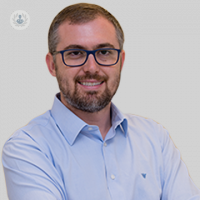¿Cómo detecto si mi hijo es autista?
Written by:The doctor. Fernández Fernández, specialist in Pediatric Neurology, is an expert in the treatment of behavior disorders and learning disorders. With more than 10 years of experience, he is coordinator of the Pediatric Neurology Area of the Andalusian Institute of Pediatric Neurology and of the ADHD Group of the European Society of Pediatric Neurology.. In the following article he explains everything we need to know about autism.
What is autism and why is it produced?
Autism is a disorder of neurodevelopment , brain neurological development, which affects children, which is basically caused by an alteration in the maturation process. The final cause is not known but in most cases there is a genetic basis, that is, either hereditary or new but a genetic alteration, a damage at the molecular level, that produces the alteration in the process of cerebral maturation. This affects a series of brain areas, which regulate the functioning of the modulation mechanisms of social relationships, personal contact and mental flexibility. This is something more complicated than I am explaining, but basically that is the main origin: a neurodevelopmental disorder, derived from a disorder in the genetic alteration that produces, in most cases, an impairment of brain development.

What are the first symptoms and at what age do they usually appear?
The age of onset of autism is very variable. The more intense the symptoms are, the more serious the case is, these alterations occur before or this presentation of the symptoms. In general, around 18 months is when they begin to detect these alterations in a significant way. Mainly a difficulty in eye contact and communication, an alteration in the ability to relate to others, and a series of repetitive behaviors, inflexible and generally especially obsessive or manic. These are the three main characteristics that produce these symptoms in these children, as I say, difficulty in communication, in the social relationship and in the establishment of excessively repetitive or inflexible behaviors and habits.. The sooner it appears the more intense the symptoms and the more alterations it will produce. So, one of the main difficulties that these children have at the beginning is verbal communication. It is difficult for him to relate to others, especially in the verbal relationship. This causes difficulties in the integration and of course in both their peers and parents.
Can autism be prevented?
There is really no way to predict 100% autism. It can not be prevented, among other things, because we do not have a perfectly reliable information of what is the definitive cause. It is true, as we said earlier that the origin is largely genetic but it is not only those factors that influence us. There are also a number of environmental factors that we can control, at least in part. The type of food, the type of substance consumption during pregnancy, we must avoid situations that produce risks or alterations, such as alcohol consumption, drugs, exposure to pollutants. Such situations are easily preventable and can reduce the risk. It is also important to take into account the existence of a family history. The consanguinity, the relationship of cousins, siblings, etc, among the parents of children with autism favors a much higher appearance of these alterations, of this diagnosis and, of course, if there is a family history already diagnosed of autism is a factor also to consider. As I say, this type of alterations are difficult to prevent and the fundamental factor that we have to take into account is the early detection and especially the suspicion in case there is a case in the family previously.


